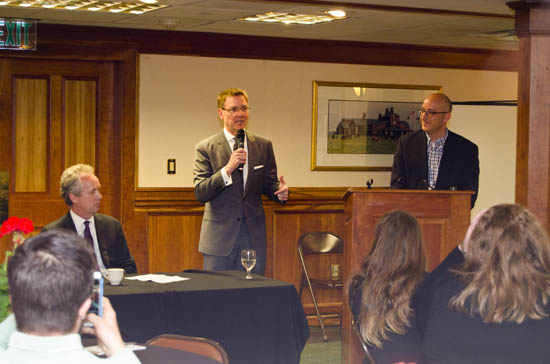Collective minds address supply side of local food
Collective minds address supply side of local food

What will it take to grow a thriving local food system? What role can institutions play in supporting local food production, and where will the supply come from? More than 40 farmers, processors, distributors, lenders and market leaders recently convened on the University of Kentucky campus for the Bluegrass Barn Raising to discuss strategies for expanding the supply of local foods.
The event is a joint effort of stakeholders within the Lexington and Louisville foodsheds. A similar event was held last year in Louisville. This year, participants focused on increasing local food service to large organizations such as hospitals, school districts, higher education institutions, as well as large food retailers.
Mayor Jim Gray of Lexington and Louisville’s Mayor Greg Fisher launched the morning session with a panel discussion moderated by Joel Neaveill, chief of staff of the Governor’s Office of Agricultural Policy. Both mayors emphasized how a local food system benefits the overall economy.
“In many senses, we’re talking about a heritage economy, built for our own people,” Gray said. “There’s that aphorism in (the film) Field of Dreams, ‘Build it, and they will come.’ Build it for your own people first, and then others will come.”
Fischer said Louisville annually consumes about $300 million worth of local food, but the 2013 Louisville Local Food Demand Analysis found there is about $500 million of unmet demand.
“Given that agriculture is responsible for about $6 billion of the state’s economy, we could increase that by 10 percent by meeting that unmet demand in Louisville alone,” he said.
Both mayors emphasized the ongoing collaboration between the two cities, a collaboration that also affects the surrounding “super-region,” an area that includes 38 Central Kentucky counties.
Seated around tables in small groups, event participants put their heads together to answer such questions as what factors influence the decision to purchase locally grown foods; what are the barriers that limit expansion of production; and are there existing resources that could be redesigned to better address those barriers.
“How do we get from Point A, the farm, to Point B, the institutional market? Distribution, aggregation, processing and marketing are all steps along the way that we should consider,” said Ashton Potter Wright, director of Bluegrass Farm to Table, an economic development initiative of the city of Lexington. “Financing, too, is an important part of the journey, so we have investors in the room, which we hope will help create some opportunities.”
Last year’s Louisville Barn Raising resulted in a number of projects, including the West Louisville Food Port, a multi-tenant facility to be constructed on city property, which will support all aspects of the local food system; the conversion of a former restaurant into a kitchen incubator that will support fledgling food entrepreneurs; the formation of the Kentucky Cheese Guild; and a project team that is addressing the need for farmland preservation and the demand for organic farmland in the state.
“It’s exciting to see the conversation we started at the Louisville Barn Raising happening on a regional level,” said Theresa Zawacki, Louisville Forward senior policy adviser. “It is rare to gather folks representing all aspects of our local food system in a room to think about how we can play to our strengths and authenticity to create more economic opportunity around local food. I expect the strategies developed at the Bluegrass Barn Raising to expand our local food economy in meaningful and visible ways.”
Planning partners in the Bluegrass Barn Raising included the Governor’s Office of Agricultural Policy, the Kentucky Department of Agriculture, Bluegrass Farm to Table, Louisville Metro Government, Woodford Forward and The Food Connection at UK.
The Food Connection at UK is a consortium housed in the College of Agriculture, Food and Environment and composed of members from across the university, UK Dining, Lexington-Fayette Urban County Government, and the Kentucky Department of Agriculture. It is tasked with building a strong network of producers and processors to provide local and Kentucky Proud ingredients for campus dining facilities.
“I think having players from across the food system who are looking at the sorts of investments and partnerships that are needed to build a profitable and high impact regional food infrastructure is a step in the right direction. It helps us strategize better on how to collaborate in meaningful ways, gives new insight and helps build transparency along the food chain,” said Lilian Brislen, The Food Connection executive director. “It requires community, because really, it’s all about community.”
After participants spent a long day of discussion and planning, Wright was encouraged by the results.
“We built consensus around some concrete next steps and initiated some regional projects that will impact Lexington, Louisville and the surrounding counties,” she said.
Community Development Crops Economics Events Horticulture Livestock Sustainability

